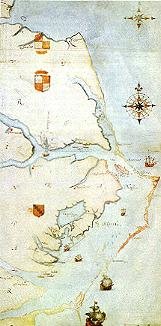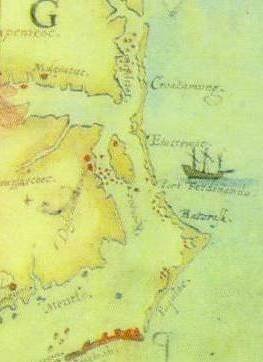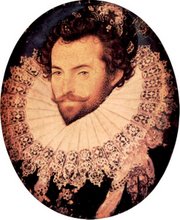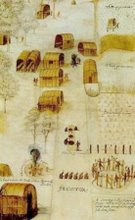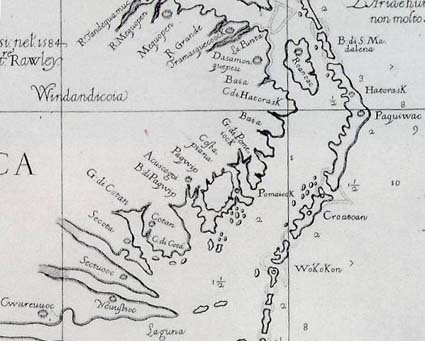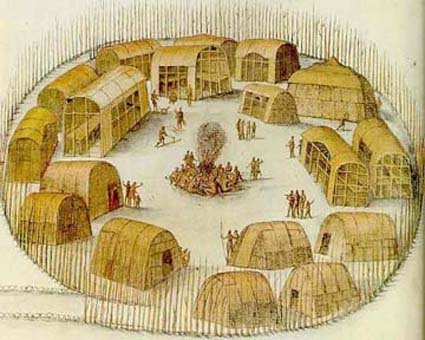
November 2, 2008
Hi Everyone,
I’ve had a couple of people e-mail me and ask if there is any new research or news in the Lost Colony project.
First, I want to remind everyone that regular communications to project participants happens on the Yahoo list. If you’re not a member, you’ll need to be invited in order to join (to prevent spammers) so just drop me an e-mail and I’ll send you an invite.
In spite of the fact that not much has been going on publicly, there is progress, although it is slow.
What Have the Participants Been Doing?
Initially, I had hoped that our participants would research and extract their own surnames from early North Carolina documents. I’m sorry to say that very little of that kind of work has been done, and clearly, the scope and magnitude of this assignment is too large for the administrators to undertake. I’m still hoping that each and every one of you, the participants, will schedule some time to work on your surnames in early NC and send the results to us so we can locate the early possibilities to tie into our timeline. If you review early documents, like extracted deed or court records for example, and you don’t find your surname or derivative spellings, that’s still very important data so please let me know that as well.
Several participants have found relevant data in historical documents and land grants and have forwarded that which I have either posted to the Yahoo group as an e-mail or asked Nelda to put on the web page, or both.
Webpage and the Blog
Speaking of the webpage, that is one of the changes. Nelda has given the page a new look, feel and music. If you haven’t visited recently, please check it out. There is also a new article that explains a lot about the basics of DNA and how the new DNA tests work (as part of a Melungeon article).
Don’t forget our blog either. You can now subscribe by e-mail too. Our blog is where Janet and Penny regularly post relevant articles that pertain to the search for the colonists and other historical documents referencing Eastern NC. If you’re not subscribed or checking this resource regularly, you’re missing out.
What Have the Administrators Been Doing?
Each of the administrators has a specialty that is their passion and each of us is working on what we need to do for our focus. Here’s a quick update.
Rob Noles is the admin of the Lumbee project as well. Because of the possible/probable link to the Lumbee, he continues to focus on obtaining both DNA participants and associated genealogies of the relevant families. Rob has also has a couple of surgeries this past year along with two hurricanes, so he’s been very busy.
Nelda Percival is our webmistress and she is busy all of the time keeping our site current and adding new information. Nelda too had surgery earlier this year but celebrated her recovery by purchasing a motor scooter and customizing it. Unfortunately, she wasn’t able to ride it to the Lost Colony event in August in North Carolina.
Speaking of the Lost Colony event, Anne Poole has been coordinating the North Carolina research and has she ever been busy. In August, we were honored to be invited to participate for the second year at the Virginia Dare Faire at historic Fort Raleigh in Manteo. That is where the Lost Colony play takes place every summer. It is located at the Fort Raleigh National Park Service historical site.
In 2007, we were located in the lobby of the Park Offices, but this year we were in the newly rebuilt Costume Barn. You may recall that the barn burned after the 2007 season. Fortunately, the barn was rebuilt and the costumes recreated for the 2008 season. The grand finale performance is always the night of the Virginia Dare Faire, the anniversary of her birthday, August 18th, followed by a cast party. Anne, Jennifer Sheppard, our genealogist and other volunteers who were able to join her were able to attend the cast party after the event.
During the day, they were able to talk to many guests about the Lost Colony as a historical event, as well as our project. Nelda designed brochures for us well as new business cards and a banner, so we are prepared for next year and other presentations as well. For anyone who wants a copy, the surname flyer is available here at the bottom of the page.
We are planning to attend next year as well so mark the date of August 18th and maybe you can join us. We can always use more volunteers to work the booth with us, or just come by and say hello. It’s a wonderful event sponsored by the Park Service.
In addition, Anne has been extremely focused on the Berry project, but more about that a little later in this newsletter.
Jennifer Sheppard, our genealogist has been focused on writing articles to get the word out there for us about the project. Several have been published with more in the works. In addition, she is available to help folks who have reached a dead end and want assistance with NC records both in Eastern NC and the archives in Raleigh.
Janet Crain and Penny Ferguson both focus on our blog, keeping it fresh and up-to-date, although both have faced personal or family health issues this year as well. In addition, both are administrators for the Melungeon project which may dovetail with our project and that of the Lumbee project eventually. Additionally, Penny and I co-admin the Cumberland Gap projects (yline and mtdna). All three of us work extensively with historical records and it’s amazing to me how many of the records pertain to both the Gap and the LC project as well as others. How is that possible? Well, for example, this past week I’ve been reading the earliest NC General Assembly Session Notes to find entries relative to the Native Tribes and any slaves or free persons of color. In the session notes, I have found a great deal about the early tribes of Eastern NC, plus eventually the cession notes for the renegade State of Franklin in the last quarter of the 1700s along with many petitions signed by both natives and whites.
Joe Chandler has been busily working on the English records trying to find evidence of relatives of the colonists through court records. The eventual success of the DNA project relies on being able to find descendants of the families of the colonists to test to be able to prove, hopefully, that the colonists did survive. While this facet of the project is not imminent, the research must occur to identify the appropriate families. Joe has also had his share of health issues this year, unfortunately delaying a planned trip to London to work in the archives directly.
Dr. Ana Oquendo Pabon continues with her research work with mitochondrial DNA in both the Native and African Diaspora populations. Mitochondrial DNA may in fact be the defining factor in identifying Native populations and migrations as it appears from DNA testing that few Native males survived the various wars, epidemics and alcohol, a deadly curse of which they were so fond, as revealed by oral history and various court records.
Roberta Estes (that’s me) has been focused on the DNA aspect, but aside from that, has been reading and indexing early records in NC pertaining to Indians, slaves who have last names and Free Persons of Color. Testing has led us to believe that many of the Indian populations were joined by those with African ancestry, along with males of European ancestry. We are attempting to find the sources of that African ancestry through early records along with individuals proven to be Indians through court, marriage or deed records. Another good indicator of either Indian or African ancestry is to be counted on the tax lists as a “free person of color”, sometimes noted as “fpc” or “free negro”, “mulatto”, “mixed blood” or other indicator of some ancestry other than “European”. I am creating a research data base of every reference. So far, I have almost 1900 entries of individuals along with the supporting text and references. This sortable data base promises to make our research over the years much much easier. If you have any documents that fall into this category, please, please send them to me.
I have been fortunate enough to have a volunteer to help with part of this, Larry Ratliff. Thank you Larry. If you can help transcribe, let me know. So far, here are the documents that have been have transcribed:
• 1711 Tuscarora Treaty
• 1766 Tuscarora Land Lease
• Annals of the Ashpole Community 1750 – 1814
• Articles of Agreement with the Bay (Bear) River Indians – 1699
• Beaufort Co Free People of Color 1790
• Bertie County Deed Book M – (a few select entries only – this entire deed book need to be reviewed for relevant information)
• Carteret County Free Persons of Color 1790
• Chowan County Free Persons of Color 1790
• Craven Co., NC, It's Origin and Beginning, by Dr. Charles Holloman
• Excavating Occaneechi Town
• History of the Tuscarora
• Hyde Co., NC Apprentice Papers Free Persons of Color
• Implosion, the Secret History of the Origins of the Lumbee Indians by Morris Britt (index only, book itself has not yet been published)
• Mattamuskeet Land Records 1727-1792
• Peace Treaty with Tuscarora – 1712
• The American Indian in North Carolina by Rev Douglas L. Rights
• The Croatan Indians of Sampson County, N.C - Their Origin & Racial Status. A Plea for Separate Schools
• The Mattamuskeet Documents, A Study in Social History by Patrick H. Garrow
• Some privately contributed documents
I have a few more in process, but if you have suggestions for publications that should be added, please let me know.
Breakthroughs
We have two projects that seem to have taken on a life of their own and have sustained some very promising breakthroughs. Needless to say, if you are related to either of these families or have any information regarding these families, we need your help.
The Berry Project
A few months ago, a participant from England visited Fort Raleigh and during his visit, tested his DNA. The search for the Lost Colonists has always intrigued him, and now upon his return to England, he has collaborated with a few other local history buffs to undertake a search in England for some of our colonist surnames. In particular, many of the colonist families appear to be from the Devon area.
This small group has retained a professional genealogist and based on the information we have, plus the expertise of the genealogist there, is attempting to find and sort out the various Berry families. We have selected the Berry surname because of the recent breakthroughs with the genealogy and history surrounding that surname.
As luck would have it, a professional genealogist in NC was working with a Berry gentleman about this same time, and traces his roots to very early NC. This gentleman tested his DNA and eventually proved to match a Berry gentleman from the area we are searching in England.
Fate, smiling on us, brought us no less than 3 other individuals whose family oral history tells them they are direct descendants of Richard and Henry Berrye, the colonists. Anne Poole, being the person working in North Carolina with oral history has been attempting to tie together the loose ends of these various genealogies, but the sheer amount of data has come so fast and been so overwhelming in magnitude that we are still working to sort out what is fact, what is oral history, what has been checked and what still needs attention.
The Berry surname is one where we desperately need all of the early county records in NC to be checked, so if you own any of the books relative to these county records, and you’re willing to extract everything Berry, Barry or similarly spelled, please let us know. We could really use your help on this.
Of all of the surnames, so far, this one holds the most promise because of the English connection and the very early appearance in NC.
The Beasley Project
Sometimes as a genealogist, fate smiles on you. From my experience, those days are rare, but when fate does smile, it’s a HUGE breakthrough, and often, the result of a combination of things that can only be chalked up to chance, or synchronicity.
The Beasley surname is of Native origin, a proven Chowan Indian chief whose tribe was mentioned by John Lawson in 1701 and was located at the mouth of the Neuse River. One of our participants, Mark Beasley, has of course had his DNA tested, and as such has eliminated the known European Beasley lines known to be in early VA and NC. Furthermore, he “loses” his John Beasley in exactly the same area where Chief Beasley’s village was known to be.
Mark and his wife have spent two years and multiple trips back to NC and have just recently found the actual land where his family lived, in addition to the land where Chief Beasley probably lived as well. This story is amazing in and of itself as he has combined all of the requisite genealogical and historical research with title and deed work to locate the land today, then visited the locations finding more information than could ever be found in a book. I hope he will write about his amazing adventure in a future newsletter for us.
If in fact the colonists did survive, they would have had to assimilate with the Native Tribes. If they assimilated with the Native Tribes, the Hatteras would be one of the most likely, and the Hatteras eventually died off and they too assimilated into other tribes, including the Chowan, Coree and others.
Due to the recent breakthroughs, Mark is attempting to organize and assemble all of his information. If you have any information about the Chowan, Coree, Hatteras and related records, or the surname Beasley is in your lines, please contact Mark at mark@beasley1.com.
If you have any documents that show any surnames associated with the Hatteras Indians, please
email me. restes@comcast.net
Paying It Forward
A long time ago, when I was a young genealogist, someone did me a huge favor that had to have taken them hours. I was young, but I wasn’t stupid, and I could hardly believe they had done that for me. The family I was researching wasn’t in any way related to them, but they had access to records that I didn’t have, and as a young mother, couldn’t afford.
This was before the days of online access, although most of the records we need for the Lost Colony project still fall into this category as they are transcriptions of early records (marriage, deed, court) and those aren’t online either, as someone privately has published them.
When I thanked my benefactor in disbelief, she said to me “pay it forward”. I didn’t understand the phrase, having never heard it before, and she told me to do favors for others with no expectation of receiving anything in return. She told me that by “paying it forward”, it would eventually pay me back in far more ways than I would ever imagine and it would be multiplied.
I’m here to tell you how right she was. I get a lot of joy out of helping others although it does take a lot of time and I sometimes neglect my own genealogy (Ok, I often neglect it) in favor of DNA projects and such. DNA projects of course involve genealogy and history and I find myself reading these obtuse documents and I just feel compelled to document things like old petitions and such, posting them to forums where people can find them if their ancestors might have signed.
I’ve been very blessed to find my own family through these chance encounters when someone writes to thank me for some long ago posting I’ve forgotten about, but then we find our common ancestor. In some cases, they’ve held the key for me about something I could never have found otherwise.
However, my biggest and best example of “pay it forward” is actually this Lost Colony project. You may not know that I have no reason to think that my own ancestors were Colonists. My interest is not that of a participant, and yes, I often wonder at my own sanity. However, this search and this project is “meant to be” on many different levels, and for me, here’s the proof.
In some back and forth conversation with one of our project participants, he made a comment about Vermont and that he was much more familiar with records in the NorthEast. I told him I was stuck there and gave him the name of my problem couple. He found a similar name and pointed me to a Canadian resource I had never previously found.
Although this initial find was not my ancestor, as the dates did not line up, the names within the family matched and it was a rare surname and other circumstances such as the fact that my ancestor spoke French were confirmed. I suspected I had found the right family, but I just didn’t have the right branch although research was very difficult and documents seemed nonexistent. Furthermore, no one else was researching this family. I posted my information on some new boards, as this family was of Acadian decent.
Ironically, my posting sat idle for about a year, when a man of the same surname answered me from Canada, in French. He told me he had the info I was seeking as he had written a book about the family, in French, of course. We struggled back and forth with our language barrier, but eventually, we exchanged information and indeed, he did have the birth record of my ancestor.
I was right, it was the correct family, but the records I found were after the entire family converted from the Catholic religion to a Protestant church in 1821. My ancestor’s nieces and nephews all carried the same names as his own children, with some even being named after him, which is one of the initial hints that I had the right family, but the wrong generation.
My ancestor was born in 1805 and was baptized in the Catholic church. I only had found the transcribed Protestant Church records and never thought to check Catholic records, even if I could have gained access to (and read) unindexed, unpublished records written in French and Latin by a Canadian priest. That scenario was pretty unlikely.
Given that this family is of Acadian heritage and that the Acadians have been heavily studied, I worked with several Acadian cousins (all Acadians are cousins to each other) to finish the research on my family lines that had not yet been documented. In the past few months, I have added……..are you ready for this…….over 45 new and previously unknown, documented, surnames to my family tree and about 150 new direct ancestors. I have also found original signatures for many of them through the early Catholic church records (that have recently come online) and yes, also old petitions. Signatures, absent pictures, are often the only personal thing left on this earth belonging to our ancestors.
So David, I can’t thank you enough for your help. I hope you benefit as much from someone’s gift to you someday as I did from yours. And for everyone else…..”pay it forward”.
Bye For Now
I hope this newsletter has inspired you to pick up some genealogy you’ve set aside or to read a historical document.
The holidays are coming. Maybe this is a good time to document your genealogy as a gift book for your family. Pass it on and make sure your hard work isn’t lost to future generations.
If you find something relevant to our search for the colonists, please send it to us and we’ll post it on the Yahoo list for others as well. It only takes a minute and you never know what will happen!
Happy Ancestor Hunting,
Roberta
Monday, November 3, 2008
Lost Colony Project Newsletter, Roberta Estes
Posted by
Historical Melungeons
at
11/03/2008 09:22:00 PM
![]()
Labels: Nov. 2008 Newsletter


